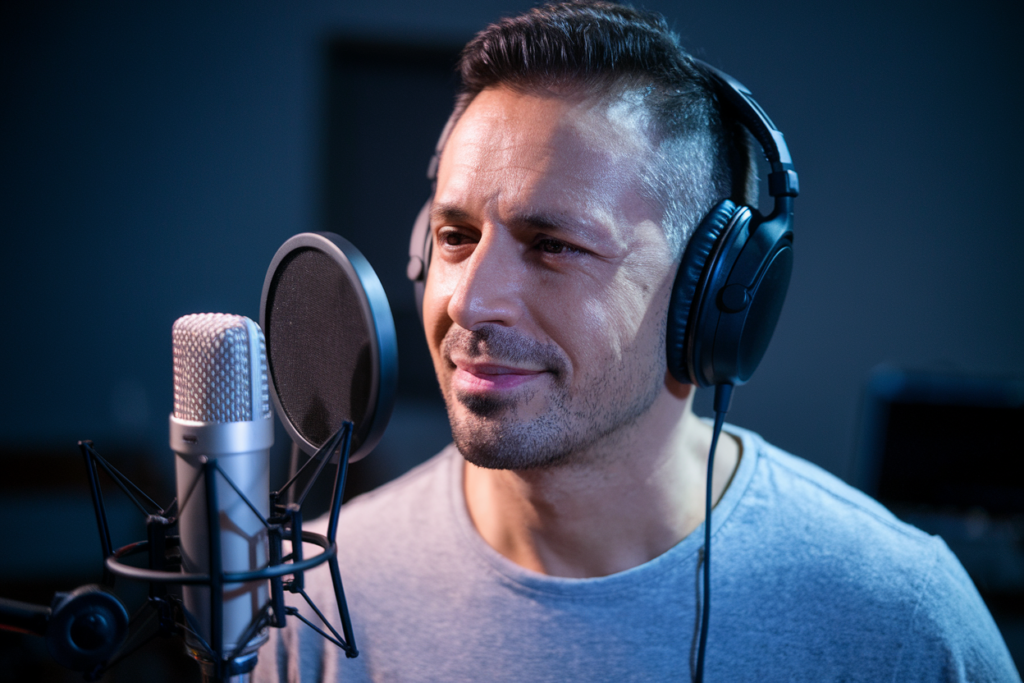Key Takeaways
- Cultural Relevance is Key: Tailoring media content to reflect local customs and values fosters deeper connections with the Turkish audience, enhancing engagement and trust.
- Market Expansion Opportunities: Localizing media allows access to over 85 million people in Turkey, creating potential for increased viewership and revenue through relatable content.
- Enhanced User Experience: Accurate language use and user-friendly interfaces improve accessibility, making the content more enjoyable and relatable for Turkish viewers.
- Competitive Advantage: Effective localization differentiates your brand from competitors by showcasing a commitment to understanding Turkish culture, leading to stronger viewer loyalty.
- Emotional Engagement Through Voiceovers: Utilizing native voice talent adds authenticity and emotional resonance, significantly enhancing audience connection with localized content.
Ever wondered how Turkish localization can transform your media strategy? As the digital landscape expands, reaching diverse audiences has never been more crucial. With Turkey’s rich culture and growing market, localizing your content isn’t just a nice-to-have; it’s a game changer.
Overview of Turkish Localization
Turkish localization plays a vital role in tailoring media content to the specific needs and preferences of the Turkish audience. By adapting language, cultural references, and visuals, you can create an engaging experience that resonates with viewers. This process goes beyond mere translation; it involves understanding local nuances and expectations.
You’ll find that incorporating voiceovers in your localized content adds another layer of connection. Using native voice talent helps convey authenticity and relatability. The right voice artist not only speaks the language fluently but also captures the emotional tone, ensuring your message hits home.
Moreover, considering regional dialects enhances accessibility. Turkey has diverse accents and linguistic variations across its regions. A skilled voice actor familiar with these subtleties can significantly improve audience engagement by making your content feel more personalized.
Localization also boosts market competitiveness. With Turkey’s burgeoning digital landscape, businesses that invest in tailored content are better positioned to attract and retain customers. Whether it’s for advertisements or educational materials, localized media stands out in a crowded marketplace.
Effective Turkish localization enriches media strategies through cultural relevance, emotional resonance via professional voiceovers, and increased market appeal—essential elements for any successful campaign targeting this vibrant demographic.
Cultural Relevance
Cultural relevance plays a crucial role in connecting with the Turkish audience. Tailoring media content to reflect local customs, values, and attitudes fosters a deeper connection. It’s not just about what you say; it’s also about how you say it.
Understanding Turkish Culture
Understanding Turkish culture involves recognizing its rich history and diverse influences. Turkey’s unique blend of East and West creates a distinct cultural landscape that shapes preferences in media consumption. References to local traditions, holidays, and societal norms resonate more deeply when they align with viewers’ experiences. For instance, incorporating familiar expressions or idioms can enhance relatability and foster trust between your brand and the audience.
Impact on Audience Engagement
Audience engagement soars when media resonates culturally. Effective localization captures attention by aligning content with viewers’ daily lives, interests, and emotions. Integrating voiceovers from native speakers adds an authentic touch that elevates the overall experience. When voice talent conveys messages using familiar accents or dialects, it instills confidence in the message being delivered. This sense of familiarity encourages viewers to connect emotionally with your content, ultimately driving higher engagement rates.
Incorporating these elements into your media strategy not only enhances visibility but also strengthens relationships with audiences in Turkey—making cultural relevance an essential component of effective communication.
Market Expansion
Turkish localization opens doors to an expanding market. By tailoring your media content for Turkish audiences, you tap into a diverse and growing demographic eager for relatable and culturally relevant material.
Accessing a Growing Audience
Reaching the Turkish audience means connecting with over 85 million people who value media that speaks to their culture and experiences. Localized content resonates more deeply, fostering trust and loyalty among viewers. Adapting language, cultural references, and visuals creates an emotional bond that generic content simply can’t achieve. Think about it—when your media reflects local customs and values, it engages viewers on a personal level, making them feel seen and understood.
Increased Revenue Opportunities
Investing in Turkish localization boosts your revenue potential significantly. When you engage this market effectively, you’re likely to see increased viewership and higher conversion rates. Consider how localized promotions or campaigns can lead to greater brand affinity. Moreover, using native voiceover talent enhances authenticity; when your message sounds genuine, it encourages engagement from the audience. Authenticity matters—people are drawn to brands that resonate with their lives.
Localization isn’t just about translation; it’s about creating connections that drive business success in Turkey’s vibrant media landscape.
Enhanced User Experience
Turkish localization significantly enhances user experience by creating content that resonates with the audience on multiple levels. When you tailor your media to meet local preferences, you establish a connection that feels authentic and relatable.
Language Accuracy and Clarity
Language accuracy in Turkish localization ensures your message is not only understood but also appreciated. Using culturally appropriate phrases and expressions conveys respect for the audience’s language. Accurate translations maintain clarity, preventing misunderstandings that could alienate viewers. For example, incorporating humor or idiomatic expressions specific to Turkish culture enriches engagement. This attention to detail transforms simple words into impactful messages, making audiences feel valued.
User-Friendly Interfaces
User-friendly interfaces play a crucial role in enhancing the overall experience for Turkish viewers. Designing platforms with familiar navigation styles improves accessibility and comfort while consuming content. Ensuring menus, buttons, and prompts use clear language tailored to local customs makes interactions seamless. Visual elements should reflect cultural aesthetics—colors, images, and layouts familiar to the Turkish audience create instant connections. These thoughtful adjustments elevate user satisfaction, fostering loyalty towards your brand while increasing the likelihood of repeat visits.
Integrating voiceovers into localized content further amplifies this enhanced experience. Utilizing native voice talent ensures a natural delivery that reflects local accents and emotional tones effectively resonates with viewers. The right voiceover can bring characters or narratives to life while establishing an emotional bond with the audience—crucial for keeping their attention engaged throughout your media pieces.
By investing in these aspects of user experience through Turkish localization, you position yourself as a trusted source within the market, ultimately driving more significant engagement from your target audience.
Competitive Advantage
Turkish localization provides a competitive edge, making media content resonate deeply with the local audience. By adapting language and cultural references to fit Turkish society, companies can communicate effectively and connect on a personal level.
Differentiating from Competitors
Differentiation is crucial in today’s crowded market. Localizing your media not only highlights your commitment to understanding the Turkish culture but also sets you apart from competitors who may offer generic, one-size-fits-all content. Tailoring visuals, messages, and even storytelling methods creates unique experiences that draw in viewers. Using native voiceover talent enhances this differentiation; it adds an authentic touch that fosters relatability and builds trust. When customers hear familiar accents or dialects in their favorite shows or ads, they’re more likely to engage with the content.
Building Brand Loyalty
Building brand loyalty hinges on creating emotional connections with your audience. When you invest in Turkish localization, you’re not just changing words; you’re crafting narratives that reflect local values and traditions. This effort resonates more profoundly than standard translations ever could. Moreover, integrating high-quality voiceovers by skilled artists enriches the viewing experience by ensuring clarity and emotional impact. People remember brands that speak their language—literally and figuratively—leading to repeat engagement and preference over time.
Incorporating these strategies makes your media not just seen but felt, solidifying relationships with viewers who appreciate tailored content reflecting their lives and cultures.
Conclusion
Embracing Turkish localization for media is a game changer. It’s not just about translating words; it’s about crafting experiences that resonate deeply with the audience. By understanding and reflecting local culture, you can foster genuine connections that drive engagement and loyalty.
Investing in tailored content opens doors to a vibrant market eager for authenticity. As Turkey’s media landscape evolves, those who prioritize localization will stand out from the competition. This commitment not only enhances user experience but also builds trust, ensuring your brand remains relevant and respected.
Ultimately, effective Turkish localization positions your business for long-term success by creating meaningful relationships with viewers who appreciate content designed specifically for them.
Frequently Asked Questions
What is Turkish localization?
Turkish localization is the process of adapting media content to meet the specific cultural, linguistic, and societal needs of the Turkish audience. It goes beyond translation by incorporating local customs, values, and visuals to create a more engaging and relatable experience.
Why is Turkish localization important for businesses?
Investing in Turkish localization helps businesses connect with over 85 million people in Turkey. It fosters trust and loyalty through culturally relevant content, driving higher engagement rates, increased viewership, and ultimately boosting revenue potential.
How does cultural relevance impact media strategies?
Cultural relevance plays a crucial role in media strategies by resonating deeper with the audience. Tailoring content to reflect local traditions and values creates emotional connections that generic content fails to achieve, enhancing viewer engagement.
What are the benefits of using native voiceovers in localized content?
Using native voiceovers adds authenticity and relatability to media content. It enhances emotional resonance with viewers, improves clarity of messaging, and establishes confidence in the brand’s commitment to understanding local culture.
How does Turkish localization enhance user experience?
Turkish localization enhances user experience by ensuring language accuracy and cultural appropriateness. User-friendly interfaces that reflect local navigation styles foster loyalty while culturally tailored visuals keep audiences engaged and encourage repeat visits.
What competitive advantage does Turkish localization offer?
Turkish localization provides a competitive edge by enabling companies to communicate effectively within Turkey’s crowded market. Adapting language and references differentiates brands from competitors who use generic content, creating unique experiences that attract viewers.
How can businesses build brand loyalty through localization?
Businesses can build brand loyalty by crafting narratives that resonate with local values and traditions. High-quality localized content creates emotional bonds with viewers who appreciate messages reflecting their lives, strengthening customer relationships over time.
Is Turkish localization just about translation?
No, Turkish localization involves much more than simple translation. It requires an understanding of local nuances—adapting language, cultural references, visuals—and integrating native elements like voiceovers to ensure messages resonate authentically with the audience.







